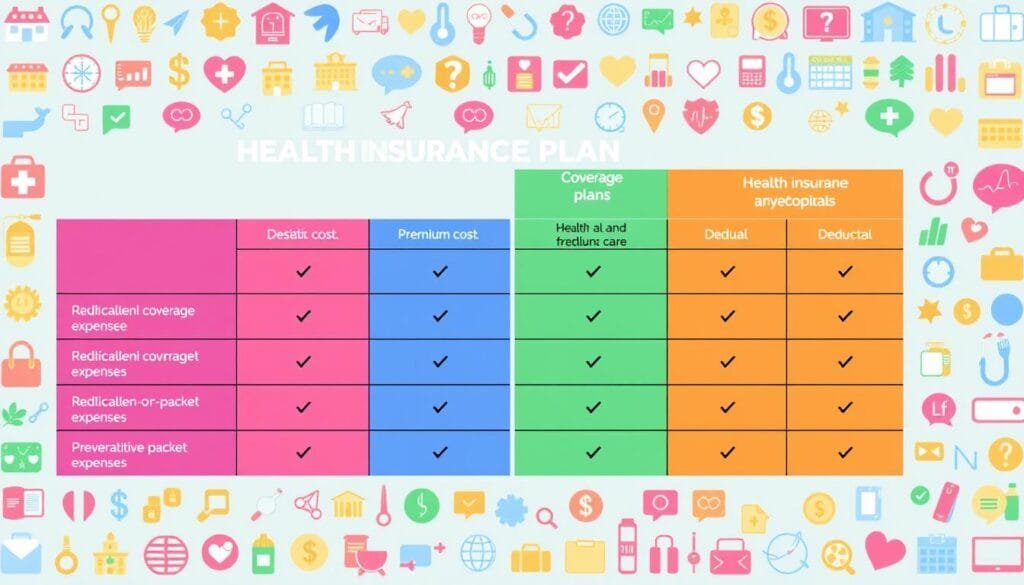ביטוח בריאות מגן על הטובת הפיזית והכלכלית שלך. חשוב להבין את הנקודות העיקריות שלו. מדריך זה יעזור לך לקבל החלטות מושכלות לגבי הכיסוי שלך.
נבחן סוגים שונים של תוכניות ואיך להעריך את צרכי הטיפול הרפואי שלך. תרוויח את הידע לבחור את הביטוח הנכון עבורך ולמשפחתך.
מרכיזים עיקריים
- ביטוח בריאות מגן נגד עלויות רפואיות גבוהות ומבטיח גישה לטיפולי בריאות איכותיים.
- הבנת סוגי תוכניות שונים, כמו תוכניות המוצעות על ידי מעסיק ותוכניות אישיות, חיונית לקבלת החלטות.
- ידע במונחים כמו דמי ביטוח, פיקדונות, ו-הוצאות מכיס עוזר לנווט בביטוח בצורה יעילה.
- הערכת צרכי הטיפול הרפואי שלך והשוואת תוכניות היא מרכזית למציאת כיסוי מתאים.
- שקול מצבים רפואיים קיימים וזכויותיך המשפטיות בעת בחירת ביטוח בריאות.
חשיבות הכיסוי ביטוח בריאות
ביטוח בריאות מגן על הכספים שלך ומבטיח גישה לטיפול בריאות ברמה גבוהה. הוא מכסה טיפולים רפואיים, אשפוז בבתי חולים וחירום בריאותי בלתי צפוי. הרשת הזו מגן עליך מהמשא ומתן של הוצאות רפואיות גבוהות.
הגנה על הכספים שלך
משבר רפואי יחיד יכול לגרום לצנזור מהיר של חסכונותיך ללא ביטוח. היתרונות של ביטוח בריאות עוזרים לנהל את ההוצאות הללו, מאפשרים לך להתמקד בשיקום. הוא גם מכסה טיפול נגיש, עוזר לך לשמור על בריאותך ולמנוע התעקשויות יקרות.
גישה לטיפול ברמה גבוהה
הביטוח מעניק לך גישה לרשת רחבה של ספקי שירותי בריאות. הגישה הזו לטיפול בריאות מאפשרת לך לטפל בבעיות בריאות במהירות. תוכל לקבל טיפולים נחוצים ממומחים מוסמכים כדי לשפר את רמת הכושר שלך.
עם ביטוח, תוכל להשתמש בטיפול נגיש יקרים כמו בדיקות וסינונים. שירותים אלה עוזרים לזהות בעיות בריאות במוקדם, לפני שהן מתקדמות.
ביטוח בריאות הוא חיוני להגנת הכספים שלך ולגישה לטיפול בריאות איכותי. הבנת היתרונות שלו עוזרת לך לקבל החלטות חכמות לגבי בריאותך ורווחתך.
סוגי תוכניות ביטוח בריאות
תוכניות ביטוח בריאות מגיעות בצורות שונות. הסוגים העיקריים הם תוכניות הממומנות על ידי מעסיק ותוכניות אישיות/משפחתיות. כל אפשרות מציעה תכונות ייחודיות כדי להתאים לצרכי טיפול בריאות שונים ולתקציבים שונים.
תוכניות הממומנות על ידי מעסיק
ביטוח בריאות בהתבסס על מעסיק לרוב מוממן ומספק כיסוי מקיף. כללית ניתנת בדרך כלל דרך פוליסת ביטוח בריאות קבוצתית. דמי פרמיום נכון לרוב משותפים בין המעסיק והעובד.
תוכניות אלו עשויות לכלול HMOs (ארגוני תחזוקת בריאות) ו־PPOs (ארגוני ספקים מועדפים). כל סוג כולל תכונות והתפשרויות משלו.
תוכניות אישיות ומשפחתיות
תוכניות אישיות ומשפחתיות זמינות דרך ביטוח פרטי
או שווקי ביטוח בריאות מבוססי מדינה. תוכניות אלו מציעות גמישות יותר באפשרויות כיסוי והתאמה אישית.
עם זאת, יתכן ויהיו לתוכניות אלו דמי פרמיום, סכומים עצמיים ועלויות מכירה גבוהים יותר. זה בגלל שהן חסרות בתרומות מצד מעסיקים.
| סוג תוכנית | ממומן על ידי המעסיק | פרטי/משפחתי |
|---|---|---|
| עלויות פרמיום | בדרך כלל נמוכות יותר, עם תמיכת המעסיק | נטייה להיות גבוהות יותר, ללא תרומת המעסיק |
| אפשרויות תוכנית | לרוב מוגבלות ל- HMOs או PPOs | מגוון רחב יותר, כולל HMOs, PPOs, ותוכניות בשוק |
| רמות כיסוי | בדרך כלל רחבות יותר | משתנות בצורה רחבה, מבסיסיות עד מקיפות |
| הרשמה | בדרך כלל בתקופות הרשמה ספציפיות | ניתן לרכוש במהלך כל השנה, עם כמה יוצאי דופן |
בחירת תוכנית ביטוח בריאות דורשת שקיפות רבה. עליך להעריך את צרכי הטיפול הרפואי שלך ואת התקציב שלך בקפידה. עיין בכל האפשרויות הזמינות כדי למצוא את הכיסוי הטוב ביותר עבורך ולמשפחתך.
מונחי ביטוח בריאות מופשטים
ביטוח בריאות עשוי להיות מבלבל עם מונחים ושפת מקצוע מורכבת. בואו נכיר כמה מונחים ביטוח בריאות נפוצים כדי לעזור לך להבין את הכיסוי שלך בצורה טובה יותר. הידע הזה יאפשר לך לקבל החלטות חכמות יותר לגבי תוכנית הבריאות שלך.
ה-פריסה היא מונח מרכזי בביטוח בריאות. זהו הסכום שתשלם לפני שהביטוח שלך יתחיל לתת שירותים. לדעת את ה-פריסה שלך עוזר לך להעריך את עלויות הכיס שלך.
תשלום עצמי הוא סכום קבוע שתשלם עבור שירותים מסוימים. כגון ביקורים אצל רופא או מרשמים. תשלומים עצמיים נמוכים יותר מעלות השירות.
שיעור השתתפות הוא עקרון חשוב נוסף להבין. זהו האחוז שתשלם לאחר שתגיע ל-
השתתפות עצמית. לדוגמה, עם 20% השתתפות עצמית, אתה משלם 20% מהעלויות בעוד הביטוח מכסה 80%.
| מונח | הגדרה |
|---|---|
| עצמי | הסכום שעליך לשלם מהכיס שלך לפני שתוכנית הביטוח שלך מתחילה לכסות את ההוצאות הרפואיות שלך. |
| תשלום עצמי | סכום קבוע שאתה משלם עבור שירות רפואי מקורה, כמו ביקור ברופא או מרשם. |
| שותפות | האחוז של הוצאות רפואיות שאתה אחראי עליהן לאחר שעמדת בעצמך בפני העצמי. |
הבנת מונחי ביטוח אלה היא חיונית. זה עוזר לך לנווט בתוכנית הבריאות שלך בצורה יעילה יותר. עם הידע הזה, תוכל לקבל החלטות טובות יותר לגבי הכיסוי הרפואי שלך.

להעצים את עצמך בידע הוא הצעד הראשון למקסם את כיסוי הביטוח הרפואי שלך.
בחירת תוכנית הביטוח הבריאות הנכונה
בחירת תוכנית הביטוח הבריאות הנכונה היא קריטית. זה משפיע על הכספים שלך ועל גישה לטיפול רפואי. ערכו בזהירות את צרכיכם והשוו בין תוכניות כדי למצוא את הכיסוי הטוב ביותר.
הערכת צרכי הבריאות שלך
התחילו בהערכת צרכי הבריאות הנוכחיים והעתידיים שלכם. שקלו את גילכם, מעמד הבריאות שלכם, וכל מצבי קיימים מראש
חשוב לחשוב על כמה פעמים באים אל רופאים או נדרשים לטיפול רפואי.
מידע זה יעזור לך להחליט על רמת הכיסוי שאתה זקוק. זה יציג גם אילו תכונות של תוכנית חשובות לך הכי.
השוואת אפשרויות תוכנית
לאחר שהבנת את צרכיך, הגיע הזמן להשוות בין תוכניות. עיין בפרטי הכיסוי כמו השתתפות עצמית, תשלומים קבועים ומקסימום לתשלומים עצמיים. וודא שהתוכנית תתאים ל-התחשבות בתקציב שלך.
בדוק את הרשת של ספקי שירותי הבריאות ואת כיסוי התרופות במרשם. בדוק אם ישנם כל יתרונות נוספים שעשויים להיות חשובים לך.
| תכונת התוכנית | תוכנית A | תוכנית B | תוכנית C |
|---|---|---|---|
| דמי פרמיום חודשיים | $200 | $300 | $400 |
| השתתפות עצמית | $1,000 | $500 | $250 |
| תשלום עצמי בביקור אצל מומחה | $50 | $30 | $20 |
| מקסימום להשתתפות עצמית | $5,000 | $3,000 | $2,000 |
שקול בזהירות את צרכי הביטוח הבריאות שלך והשווה בין תוכניות. זה יעזור לך לבחור בחוכמה. תמצא את האיזון הנכון בין כיסוי לעלות.

עלויות ביטוח בריאות ונגישות
עלויות ביטוח בריאות יכולות להיות מורכבות. הן כוללות דמי ביטוח, פריסות, והוצאות מכיס. הבנת העלויות הללו היא מרכזית לתקצוב ולקבלת הערך הטוב ביותר מהכיסוי שלך.
בסעיף זה נבחן רכיבי עלויות שונים. נספק גם אסטרטגיות לניהול הוצאות ולהפוך את הביטוח הבריאות שלך לפחות יקר.
דמי ביטוח, פריסות, והוצאות מכיס
דמי ביטוח הם תשלומים קבועים לשמירה על הכיסוי שלך. פריסות הן סכומים שאתה משלם לפני שהביטוח נכנס לתוקף.
הוצאות משלם כוללות תשלומים חלקיים ו- ביטוח עצמי לאחר שהגעתם לתקרת החובה שלכם.
העלויות הללו יכולות להתצפצף מהר. חשוב להבין איך הן עובדות. עליכם לבדוק בקפידה את צרכי הבריאות שלכם ולהשוות אפשרויות תוכניות כדי למצוא את האיזון הטוב ביותר.
אסטרטגיות לחיסכון בעלויות
- השתמשו בתוכניות ביטוח בריאות שמוצעות על ידי המעסיק או מממשלה, שעשויות להוריד באופן משמעותי את הדמי הפרמיום שלכם.
- בחרו בתוכנית עם תקרה גבוהה, שבדרך כלל מובילה להורדת דמי הפרמיום החודשיים, אך התכוננו לכיסוי של יותר הוצאות משלם לפני שהביטוח שלכם יתחיל לתת שירות.
- השתמשו בשירותי טיפול מוקדם, כגון בדיקות שנתיות וסינונים, שבדרך כלל מכוסים ב-100% על ידי תוכניות הביטוח, וכך תימנעו מטיפולים יקרים יותר בעתיד.
- משאילו עם ספקי שירותי הבריאות על מחירים מוזלים, במיוחד עבור שירותים שאינם חירום או פרוצדורות רצוניות.
- חקרו אפשרויות לתרופות גנריות, שעשויות להיות הרבה פחות יקרות מתרופות מותג.
הבנת עלויות ביטוח בריאות חיונית. על ידי שימוש באמצעים חכמים לחיסכון בעלויות, תוכל לשמור על נגישות הכיסוי שלך. הגישה הזו מבטיחה שהטיפול הבריאותי שלך יישאר כלכלית רצינית.

ביטוח בריאות ומצבים רפואיים קיימים
חוק הסיעוד הזול (ACA) שינה את כיסוי ביטוח בריאות. כעת הוא מגן על אנשים עם מצבים רפואיים קיימים. ספקי ביטוח חייבים להציע כיסוי לכולם, ללא קשר למצב הבריאות.
הבנת הזכויות שלך
לפני חוק הסיעוד, ספקי הביטוח יכלו לסרב לכיסוי עבור מצבים רפואיים קיימים. הם יכלו גם לגבות דמי פרמיום גבוהים יותר. חוק הסיעוד הפסיק את הפרקטיקות הללו.
כעת, כולם יכולים לגשת לביטוח בריאות מקיף. חולים יכולים לקבל כיסוי בלי חשש מסירוב או עלויות גבוהות יותר.
ה-ACA אוסרת תקופות המתנה עבור תופעות קיימות. הביטוח שלך חייב לכסות את התנאים הללו מיידית. ההגנה הזו עוזרת לאנשים לחפש טיפול רפואי נחוץ בלי דאגות כלכליות.


















